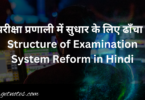Contents
Scope of School Administration
“Scope” refers to the breath, range, extent, comprehensiveness and variety of an organization. According to the dictionary, scope means the extent or range of view, outlook, application, effectiveness and operation. From this point of view, educational administration is concerned with different kinds of activities to achieve its purpose and to perform the functions enjoined upon it. Its scope extends to a vast area and a large variety of activities. Let us now try to define the scope of educational administration in the following way.
The scope of educational administration may refer to five levels- the central level, the state level, the level of local bodies, the level of private enterprise, and the school level. At each of these levels, educational administration deals with a series of problems.
The scope of educational administration is very wide and extends over different fields. Any problem of administration is concerned with its scope. These problems are solved on the basis of a broad social perspective and the way of life of the people of a country. We can broadly classify the scope of educational administration based on the manifold activities performed by it.
(i) Development of Human Personality
Dr. S.M. Dewakar once remarked, “The striking difference between the administration of education and that of other business life is the fact that the former is a human process very much influenced and controlled by various factors such as the philosophical, psychological, sociological, historical and political … Educational administration again is different from other types of administration in that it concerns itself with the development of human personality. As such, administration of education has to take into account life as a whole ranging from childhood to manhood.” Thus the scope of educational administration extends to the whole life. It performs a very difficult and delicate task.
(ii) The Purpose of Administration
No one can deny that the purpose of administration is to get something done. In the field of education, the thing to be done is nothing but educating the children, youth and other illiterate people. Here the purpose of education is to bring all components of an educational programme into harmonious and fruitful relationships.
(iii) Provision of Human and Material Resources
Educational administration is concerned with both human and material resources. The human resources include children, parents, teachers, other employees connected with education, citizens of the country, the board of education or the university and other officials at the local, state and national levels. Material resources on the other hand include money, building, playground, equipment’s and instruction supplies. It is the responsibility of educational administration to seer that all the parts are coordinated into a whole.
(iv) Legal Structure
Educational administration decides the legal structure of the whole process of educational administration. It refers to the rules and regulations that have to be framed with a view to determine the agencies of education. It also decides the types and standards of educational institutions, powers and functions of the controlling authorities, their responsibility and obligations, decentralization of school management and also to set up organizational and administrative machinery.
(v) The Educand
The child is considered as the pivot of educational enterprise. On him rests the entire structure of education. Hence the responsibility of educational administration is to frame rules for admission, promotion, discipline etc. and to implement them properly in accordance with the needs, interests, capacities and the needs, and the demands of the society.
(vi) Manpower Needs of Educational Activities
Educational administration should make necessary arrangements to meet the manpower needs of educative process. For this purpose, selection, recruitment and training of men and women must be made properly. The department of education should prescribe their qualification and standards. All employees should be provided with an attractive scale of pay, security of service and retirement benefits. An ideal scheme should be prepared for supervision and guidance. Under the supervision of the administrative set-up teachers should be provided opportunities for in-service training and reorientation. They should also be guided in the right direction to perform their work efficiently.
(vii) Decision-making in respect of Finance
It is now realized that educational finances are an integral part of the national economy. The money spent on education is a productive investment which is not only fully liquidated, but which also returns a yield over and above its value. The educational system in the long run must contribute to national economy by improving human resources. Therefore, educational administration is concerned with the following.
(a) Problem of income and expenditure and their accounting and auditing.
(b) To make decisions about the sharing of the cost of education among the center and the states.
(C) To formulate rules in respect of policy of taxation, collection of fees etc.
(d) To frame rules for budgeting, spending and controlling of funds and resources.
(e) To see that improvement of education is being made within the financial and human resources available in the country.
(f) To see that education is duly financed to provide equality of opportunity in the field of education.
(g) To see that a large number of scholarships, stipends and free studentship is given to the deserving students for democratization of educational opportunities.
(h) Attempts must be made to provide special grants for physical activities, libraries and reading rooms.
(i) Through careful analysis, allocations should be made to important educational sectors in accordance with projected manpower requirement.
(viii) Educational Administration has to deal with the Problem of Curriculum Construction
Among the ways and mean by which we can reach the determined goal of educative process, curriculum occupies the most significant and central place. It is an organized pattern of educational programme, which tries to answer the what, how and when of education. By this process students can achieve their goals, ideals and aspirations of life. Therefore, if the responsibility of educational administration is to search for the best that can be done for the children and youth in the centers of learning, it should deal with the problem of curriculum construction and its day to day development Administration should develop a comprehensive up-to-date and balanced curriculum with a view to keep pace with the consequences
of knowledge explosion. As a result of this students can develop true knowledge, skills, proper interests, attitudes and values, Administration has to pay close attention to a very broad, varied, dynamic, flexible curriculum to cope with the change as time and situation demands.
(ix) Physical Facilities
Administration should pay close attention to deal with the problem of provision and maintenances of the school plant, equipment’s, play materials, hostel building and other materials used in the hostel, furniture, apparatus, co-curricular activities, school records etc.
(x) Cooperation with the Society
Education is essentially a social affair and the school is charged by society, with the duty of training and bringing up the youth so that they may be able to participate effectively in the life of the group to which they belong. Hence education is not at all an isolated activity. It is related to life and society. To make the society worth living, educational administration should develop cooperation with society, by the process of give and take and by utilizing community resources and rendering useful services for the welfare and progress of the society.
- Difference between School Administration and Educational Administration
- Differences between Educational Administration and General Administration
- General Administration and Educational Administration
- Nature of Educational Administration
- Definitions of Educational Administration by Different Scholars
- Definitions of Educational Administration by Different Scholars
- Meaning of Educational Administration
- Principles of School Organisation and Administration
- Aims and Objectives of School Organisation
- School Organisation | Meaning of School Organisation | Meaning of School |Meaning of Organisation
Disclaimer






